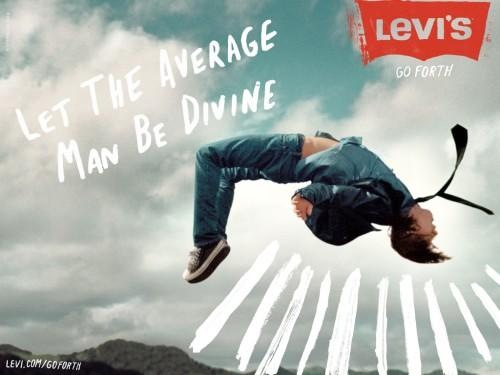 There's much to say about the commercial above, but, first and foremost, note the distinct paucity of jeans. Levi's "Go Forth" campaign at times feels less like a commercial and more like a propaganda ad for a reality that doesn't exist. This particular commercial and another one I'll show in a moment are both photographed by Ryan McGinley. What's unique about his cinematographic subjects is that while the narrative they're punctuating is about ideals, they themselves are not idealized pictures. To be sure, there is a gritty romanticism in the occasional orgastic explosions of sparks, and the subtle art deco influence on the poses stricken by many of the subjects, appearing to embrace the air. For even in the grittiest of settings, the darkest and most desaturated of filters, hope shines through.
There's much to say about the commercial above, but, first and foremost, note the distinct paucity of jeans. Levi's "Go Forth" campaign at times feels less like a commercial and more like a propaganda ad for a reality that doesn't exist. This particular commercial and another one I'll show in a moment are both photographed by Ryan McGinley. What's unique about his cinematographic subjects is that while the narrative they're punctuating is about ideals, they themselves are not idealized pictures. To be sure, there is a gritty romanticism in the occasional orgastic explosions of sparks, and the subtle art deco influence on the poses stricken by many of the subjects, appearing to embrace the air. For even in the grittiest of settings, the darkest and most desaturated of filters, hope shines through.
As such, the commercial's message of hope is empowered by the harshness and realism of imagery. Hope can be spoken of in the abstract, but in context it often has the most power. I say, "This commercial is about hope," and maybe you smile. I say, "This commercial is about overcoming insurmountable odds," and now maybe you're already finding a way to relate. Idealism alone can be perceived at times as naivete, but idealism grounded in a realistic understanding of the flawed nature of existence has the power to move the world.
 Again, there's very little talk of jeans in this commercial or anything surrounding the commercial. This is no accident. Levi is selling jeans, but even moreso they're selling an aesthetic, an identification point. People who buy Levi's are youth on the brink of change, youth who hear the transcendental words of Walt Whitman and take them to heart. This is the romantic ideal behind the gritty imagery.
Again, there's very little talk of jeans in this commercial or anything surrounding the commercial. This is no accident. Levi is selling jeans, but even moreso they're selling an aesthetic, an identification point. People who buy Levi's are youth on the brink of change, youth who hear the transcendental words of Walt Whitman and take them to heart. This is the romantic ideal behind the gritty imagery.
Another commercial from the campaign:
More Whitman, and more narration, though the recording quality of the narrative this time is much higher. The youth in this campaign are depicted as roaring, running, bounding. Levi is marketing to the "outcasts" of society, the young people who will one day change the world. They are essentially trying to reclaim the edgy youth demographic, having once appealed to the Civil Rights Marchers and demonstrators of the sixties. It should be noted that a brief depiction of homoeroticism is shown in this commercial, again looking for the voices at the edge of culture that stand poised to soon be the voice of culture. In the previous commercial, the romantic display of passion was a heterosexual, mixed-race couple, and the fact that this is meant to be edgy says a lot about how far our perceptions of cultural norms have to come.
 The hope of the young revolutionary can and will fail us. The reason there are always cultural revolutions is because no culture built by man will be perfect. History moves in cycles. Romans 5:5, however, encourages us that "hope does not disappoint us, because God has poured out his love into our hearts by the Holy Spirit, whom he has given us." Perhaps the creators of the commercial even understood this cyclical leaning towards error in the way they mostly handle the material with realism and resignation.
The hope of the young revolutionary can and will fail us. The reason there are always cultural revolutions is because no culture built by man will be perfect. History moves in cycles. Romans 5:5, however, encourages us that "hope does not disappoint us, because God has poured out his love into our hearts by the Holy Spirit, whom he has given us." Perhaps the creators of the commercial even understood this cyclical leaning towards error in the way they mostly handle the material with realism and resignation.
The young people will try to change the world.
We might as well sell them our jeans.
No comments:
Post a Comment